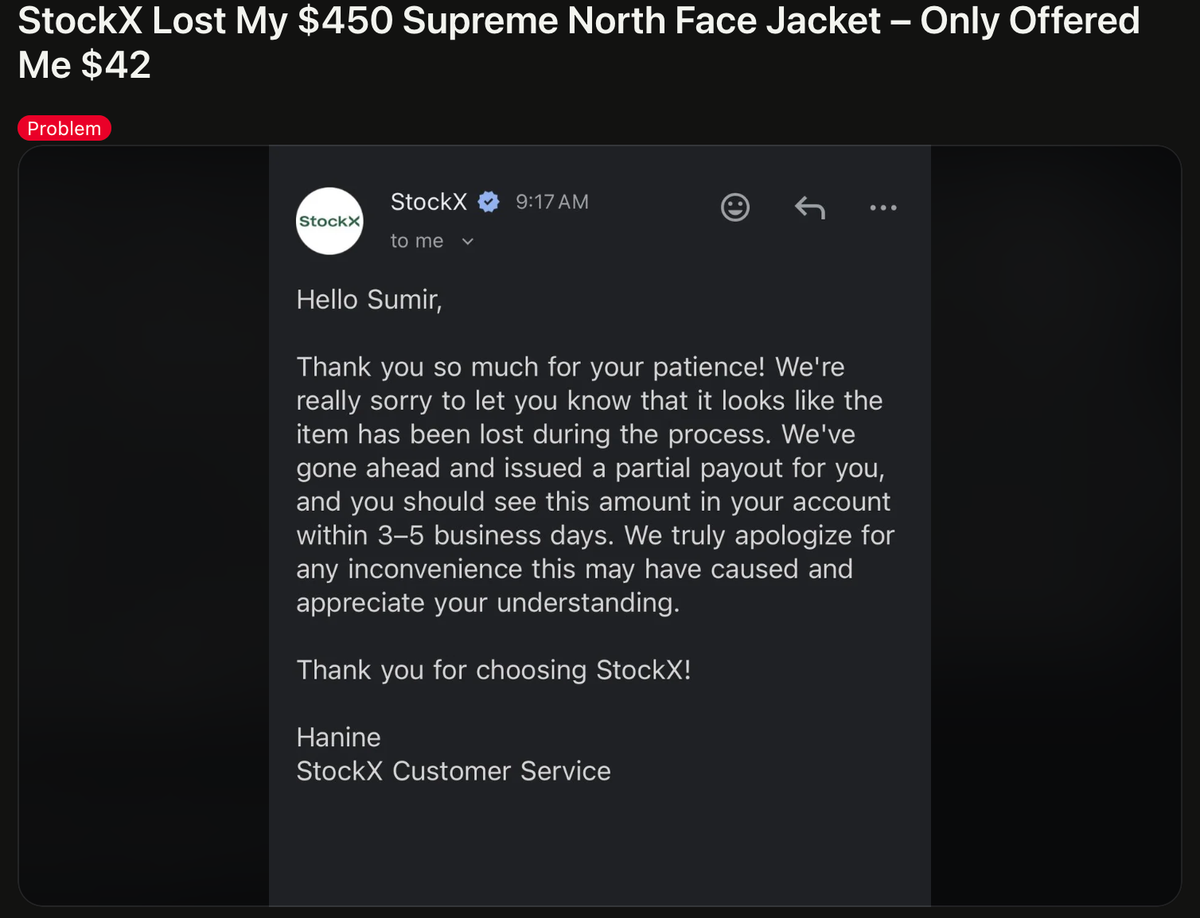A seller with 15 successful StockX transactions just lost a $450 Supreme x North Face jacket. Not to theft or damage—StockX simply lost it. After weeks of promises to return the item, they admitted they couldn't find it and offered $42 as compensation.
This isn't isolated. Search Reddit for "StockX lost" and you'll find dozens of similar stories. Sellers losing items worth hundreds or thousands, with platforms offering pennies on the dollar as "resolution."
The Real Problem: Constant Physical Handling
The seller provided Supreme receipts proving authenticity. StockX still flagged it as "suspected inauthentic," then lost it during their authentication process.
Here's what happens to every item on traditional platforms:
- Seller ships to platform - first handling risk
- Platform receives and processes - second handling
- Authentication team inspects - third handling
- Storage/warehouse movement - fourth handling
- Packaging for buyer - fifth handling
- Final shipment - sixth handling
Six different people touch your item. Six chances for human error, misplacement, or damage. This seller's jacket disappeared somewhere in that chain.
Why "Industry Standard" Isn't Good Enough
StockX's response reveals the core issue. They can't even track their own inventory properly. When they lose a $450 item, they offer $42 and call it resolved.
This happens because traditional resale platforms treat items like generic warehouse inventory instead of unique assets. Your Supreme jacket becomes "SKU #12847" in their system. When it goes missing, they have no accountability mechanism.
How METAZ Eliminates Lost Items
METAZ tokenizes sneakers with a different approach:
One-Time Authentication: Items get verified once when entering our vault. After that, they trade digitally with zero physical handling.
Automated Inventory System: Every sneaker gets paired with a unique code that requires scanning to move. The physical item can't be relocated without system authorization.
Digital Custody: Users trade ownership tokens, not physical items. The sneaker stays in one secure location until someone wants physical redemption.
Zero Handling Risk: No authentication delays, no shipping between sales, no warehouse workers moving your items around.
The Numbers Speak
StockX charged this seller fees and then lost his item. Under METAZ:
- 3% seller fee instead of 10%+
- No handling between trades
- Tracked custody with unique asset codes
- Full insurance coverage for vault storage
- Instant payouts when you sell
If this seller had used METAZ, his jacket would be safely stored in our vault, traded digitally multiple times if needed, and physically available whenever he or a future owner wanted it.
Why This Keeps Happening
Physical resale platforms can't solve the custody problem. More volume means more handling, more staff, more chances for error. They're scaling the broken part of the business model.
Every successful trade requires trusting multiple strangers not to lose your items. warehouse workers, authentication staff, shipping carriers.
The Solution Already Exists
METAZ has $700,000 in sneaker inventory stored across secure vaults in Korea and the US. Zero items lost because zero unnecessary handling.
When users trade tokenized sneakers, the physical items never move until someone wants delivery. No authentication delays, no shipping risks, no "oops we lost your $450 jacket" emails.
The seller in this Reddit post is still fighting for fair compensation. With tokenization, this situation simply doesn't exist.
Traditional platforms are asking users to accept losing items as "cost of doing business." METAZ eliminates the risk entirely.


